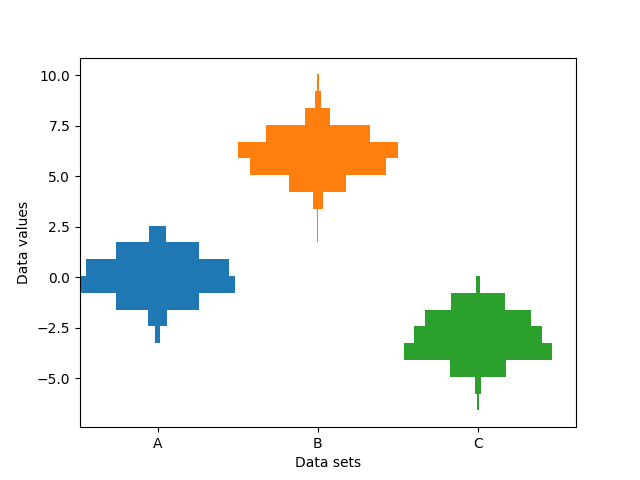注意
跳到末尾 下载完整示例代码。
多直方图并排#
此示例沿分类 x 轴绘制不同样本的水平直方图。此外,直方图围绕其 x 位置对称绘制,使其与小提琴图非常相似。
为了制作这种高度专业化的图,我们不能使用标准的 hist 方法。相反,我们使用 barh 直接绘制水平条形图。条形的垂直位置和长度通过 np.histogram 函数计算。所有样本的直方图都使用相同的范围(最小值和最大值)和箱数进行计算,这样每个样本的箱都位于相同的垂直位置。
选择不同的箱计数和大小会显著影响直方图的形状。Astropy 文档中有一个关于如何选择这些参数的精彩章节:http://docs.astropy.org/en/stable/visualization/histogram.html
import matplotlib.pyplot as plt
import numpy as np
np.random.seed(19680801)
number_of_bins = 20
# An example of three data sets to compare
number_of_data_points = 387
labels = ["A", "B", "C"]
data_sets = [np.random.normal(0, 1, number_of_data_points),
np.random.normal(6, 1, number_of_data_points),
np.random.normal(-3, 1, number_of_data_points)]
# Computed quantities to aid plotting
hist_range = (np.min(data_sets), np.max(data_sets))
binned_data_sets = [
np.histogram(d, range=hist_range, bins=number_of_bins)[0]
for d in data_sets
]
binned_maximums = np.max(binned_data_sets, axis=1)
x_locations = np.arange(0, sum(binned_maximums), np.max(binned_maximums))
# The bin_edges are the same for all of the histograms
bin_edges = np.linspace(hist_range[0], hist_range[1], number_of_bins + 1)
heights = np.diff(bin_edges)
centers = bin_edges[:-1] + heights / 2
# Cycle through and plot each histogram
fig, ax = plt.subplots()
for x_loc, binned_data in zip(x_locations, binned_data_sets):
lefts = x_loc - 0.5 * binned_data
ax.barh(centers, binned_data, height=heights, left=lefts)
ax.set_xticks(x_locations, labels)
ax.set_ylabel("Data values")
ax.set_xlabel("Data sets")
plt.show()
